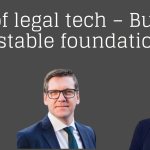DocuSign has hired Inmarsat’s senior legal counsel Richard Oliphant into a newly-created position of general counsel for Europe, the Middle East and Africa, ahead of a new, broader EU electronic signature legislation.
The Electronic Identification and Trust Services (eIDAS) Regulation, which comes into force in July 2016, establishes a new legal framework for EU electronic identification cards as well eSignatures, electronic seals, electronic registered delivery services and website authentication. It’s aim is to boost user convenience, confidence and trust, which can be expected to have a material affect on the uptake of eSignatures in Europe.
Oliphant, a corporate and commercial lawyer who has advised on Inmarsat’s commercial agreements covering its satellite airtime and terrestrial infrastructure agreements, will work alongside US GC Reggie Davis, who joined DocuSign in August 2014 from Zynga. DocuSign’s former chief legal officer Ken Moyle became its chief policy officer, heading up DocuSign’s efforts to remove barriers to the adoption of digital transaction management.
The European legal market has so far been slow to embrace eSignatures but Oliphant’s hire follows the news in September that Linklaters is now offering clients the option to sign documents directly from their smartphone, tablet or desktop after a deal with DocuSign.
At the time of the announcement in September, Linklaters had used the technology in four separate deals, with plans to roll the practice out more widely.
The Magic Circle firm said that its clients welcome the convenience of eSignatures but also the audit trail that captures who signed what, when and where for every transaction.
Linklaters London finance partner Mark Nuttall, who used the new service first, said: “On the back of the successful trial of this tool, we are discussing using the technology with many more clients, who are already thinking about how this might be introduced inside their own organisations as part of their own efficiency drives. Linklaters can assist by providing advice as to the legal implications.”






